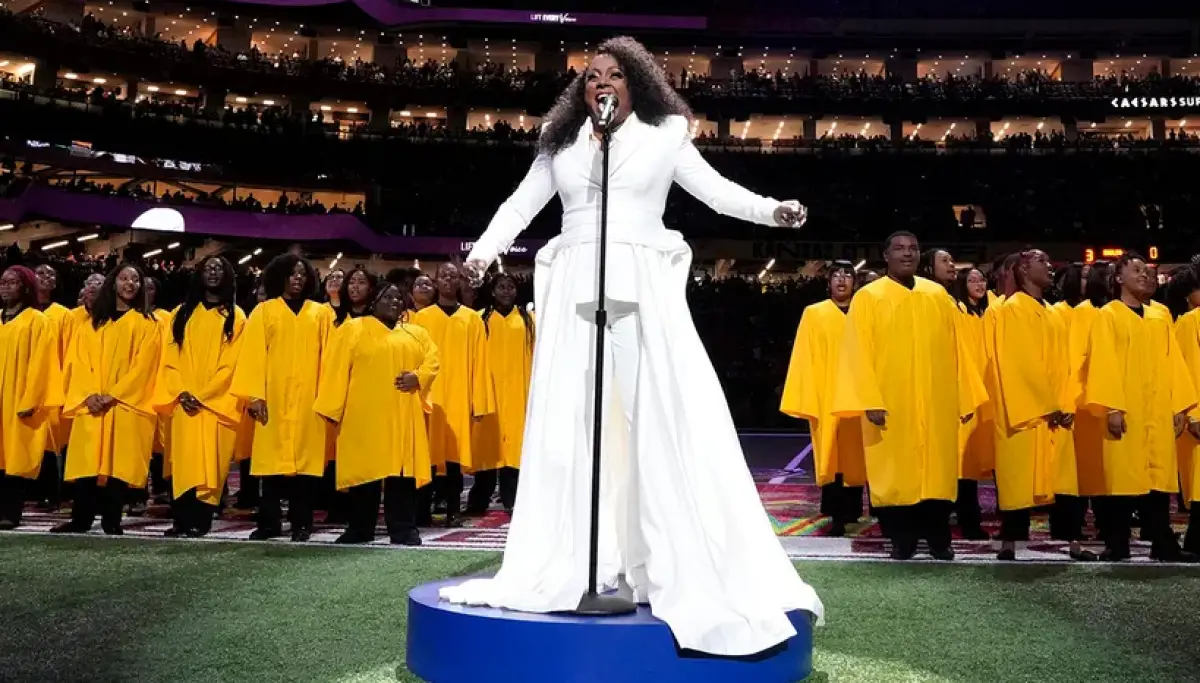In a development that has sparked fierce online debate, NFL fans are once again voicing their displeasure over the performance of “Lift Every Voice and Sing,” often referred to as the “Black National Anthem,” during the pre-game festivities at Super Bowl LIX. The controversy centers on the NFL’s decision to feature the song as a standalone anthem ahead of the traditional Star-Spangled Banner—a practice that began in the wake of George Floyd’s death in 2020 amid nationwide racial tensions.
For many critics, this separate rendition of “Lift Every Voice and Sing” is seen as an unnecessary departure from a long-held tradition. Detractors argue that in a nation where unity is paramount, introducing an alternative anthem only deepens divisions. Social media platforms have been flooded with opinions from fans who insist that all Americans should rally behind one unifying song—the Star-Spangled Banner. These voices contend that the alternative anthem, rather than fostering inclusivity, has become a divisive symbol that undermines national cohesion.
Conservative commentator and Turning Point USA influencer Rob Smith was among the most vocal critics. Smith remarked, “‘Lift Every Voice and Sing’ only started being performed at the Super Bowl in 2021 during the BLM era. This isn’t a time-honored American tradition. There is no ‘Black’ or ‘White’ National Anthem. There is only the National Anthem. Stop doing this.” His comments resonate with a segment of the fanbase that feels the practice deviates too far from what should be a unified national celebration.
The backlash has continued to grow on social media. One user on platform X tweeted, “Am I the only one who finds a ‘black’ national anthem offensive? It’s divisive. There’s no Native American, Hispanic, Asian, or white national anthem—it’s ridiculous. This DE&I relic should be retired. One America, one anthem.” Such sentiments highlight the broader debate over whether separate cultural expressions within national events strengthen diversity or instead create unnecessary rifts.
Adding to the chorus of dissent, Republican political commentator Armstrong Williams criticized the NFL in a video message recorded at the Super Bowl. Williams stated, “I am proud that there is a Black American National Anthem, but there is a time and place for everything, and the Super Bowl is not the time for playing the song.” He elaborated by emphasizing the timeless nature of the national anthem, arguing that regardless of one’s background, the anthem is meant to unite all Americans. “Yes, our history is marred by racial injustice, as it is in every nation, but our national anthem has always stood for one thing only—not for white Americans, not for Black Americans, but for every American. When that beautiful song is sung, it belongs to everyone,” Williams asserted.
This debate comes at a time when the role of diversity, equity, and inclusion (DE&I) initiatives in public life is under intense scrutiny. While many advocates argue that such initiatives promote representation and progress, critics maintain that they often lead to a fractured sense of identity. In the context of the Super Bowl—an event celebrated for its power to bring people together—some believe that presenting a separate anthem undercuts the unity that the game is supposed to inspire.
The controversy isn’t new. The NFL’s decision to play “Lift Every Voice and Sing” as a separate pre-game performance has been a flashpoint since it was first introduced in recent years. Proponents of the move argue that the song holds historical significance and reflects the diverse fabric of American society. They contend that recognizing multiple narratives through music is a way to honor the struggles and contributions of Black Americans. However, detractors see it as an unwelcome politicization of a cherished sporting event.
Further intensifying the debate, several conservative voices on social media have threatened boycotts of the Super Bowl if the NFL continues to promote what they see as a divisive practice. One user posted, “Hey @NFL, remove the so-called ‘Black National Anthem.’ America already has a National Anthem. We don’t need or want one that’s exclusive to a particular group. That only encourages division. We are all ONE NATION.” This call for a singular national symbol has resonated with many fans who believe that the essence of American unity is being compromised.
As the Super Bowl unfolds, the controversy over the “Black National Anthem” serves as a stark reminder of the ongoing cultural and political battles playing out in the United States. Whether the NFL will adjust its approach in future events remains to be seen. For now, the performance of “Lift Every Voice and Sing” continues to be a lightning rod for debate, encapsulating the tension between efforts to celebrate diversity and the desire for a unified national identity.
The discussion around the separate performance of this anthem is not just about music—it is a reflection of larger societal conversations about race, history, and what it means to be an American in today’s divided climate. As the nation watches Super Bowl LIX, the dialogue sparked by this decision underscores the powerful role that sports and cultural events play in shaping public discourse.

